Electrical Cost Estimator in Alachua
Electricians typically charge an hourly rate that varies significantly, ranging from $40 to $150. However, for most projects, the average hourly cost commonly falls within the range of $50 to $150.
This variation in electrician pricing can be attributed to several key factors, including the level of the electrician’s expertise, the complexity of the electrical work required, and the specific geographic location of the project.
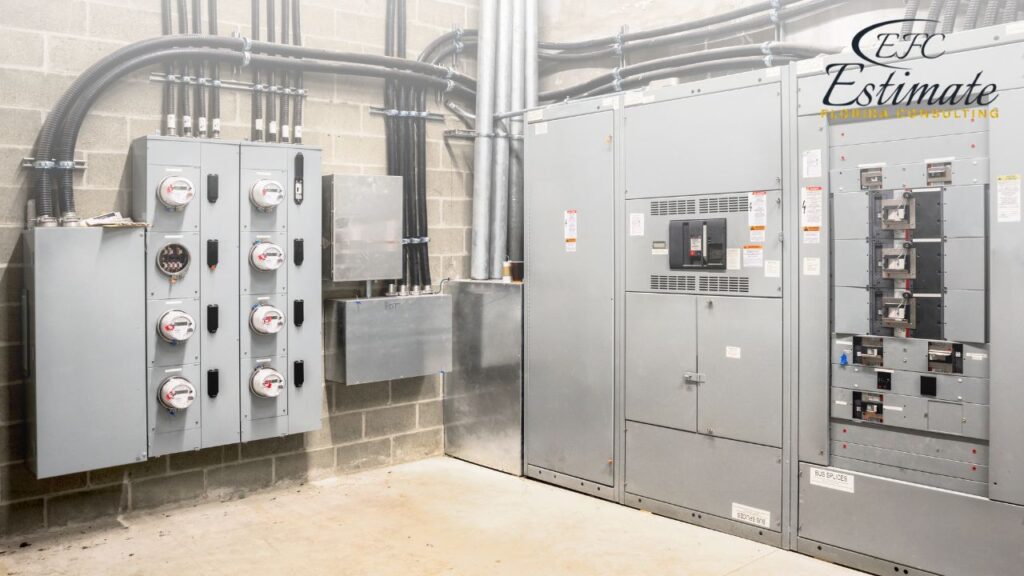
In the context of commercial and residential construction, it’s important to note that commercial electrical projects might lean towards the higher end of this range due to the typically larger scale and complexity of these projects compared to residential ones. To accurately calculate the labor costs for an electrical project, whether residential or commercial, multiplying the electrician’s hourly rate by the total number of hours required for the project is a reliable method. This calculation method provides a clear estimate of the overall labor expenses, aiding in realistic and precise budgeting for electrical work in both residential and commercial construction projects.
Electrical Wiring Cost by Type of System
There’s a range of electrical wiring systems designed to fit the unique needs of different construction projects. Lead-sheathed wiring is particularly durable, providing excellent protection against harsh conditions, making it a go-to for challenging environments. Conduit wiring, with its wires tucked safely inside conduits, is known for its flexibility and ease of maintenance. Both systems play a crucial role in the safe and effective distribution of electrical power within a building. Choosing between lead-sheathed and conduit wiring involves considering the specific building codes, the demands of the project, and environmental conditions, enabling contractors to select the best approach for each individual case.
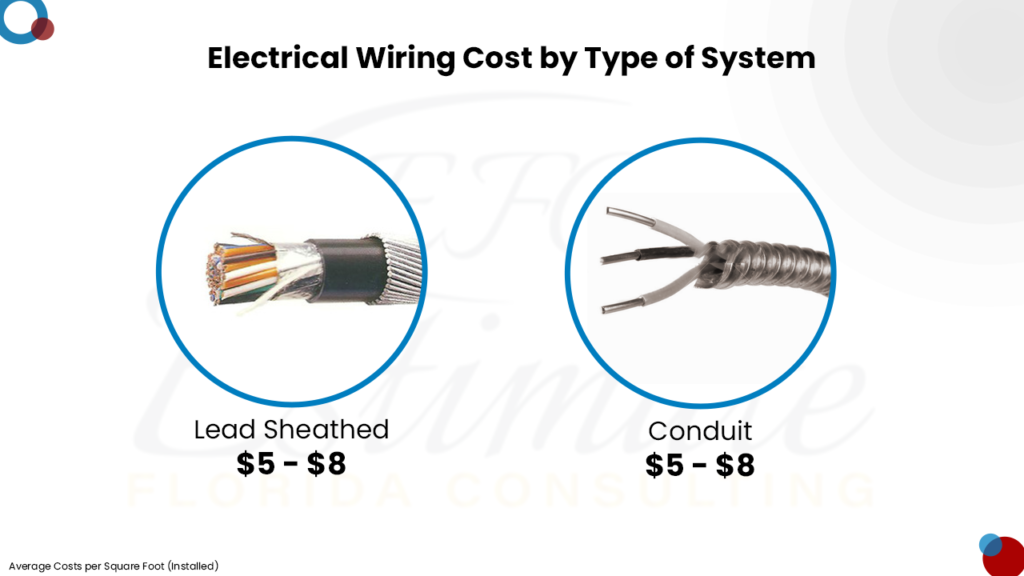
| WIRING SYSTEM | INSTALLED COST RANGE PER SQUARE FOOT |
|---|---|
| Lead Sheathed | $5 to $8 |
| Conduit | $5 to $8 |
Types Of Electrical Wiring
Type of Electrical Wiring | Increased Cost Range (USD per foot) |
Cleat Wiring | $0.75 – $1.50 |
Conduit Wiring | $2.50 – $5.00 |
Casing and Capping Wiring | $2.00 – $4.00 |
Lead Sheathed Wiring | $3.00 – $6.00 |
Underground Feeder Cable | $1.50 – $4.00 |
Armoured Cable | $4.00 – $7.00 |
Get Acquainted with Electrical Installations
Electrical House Wiring
HVAC Installation
Electrical Wiring of 3 Storey House
90% More Chances to Win Projects With Our Estimate!
- Multi-Family Building
- Hotel Building
- Hospital Building
- Warehouse Building
- School & University Building
- High-Rise Building
- Shopping Complex
- Data Center Building

Cleat Wiring ($0.75 - $1.50 per foot)
Cleat wiring is an economical and straightforward method, typically used in temporary electrical installations or places where wiring may require frequent changes. It involves securing insulated wires to walls or ceilings using cleats made of porcelain, wood, or plastic. This method allows for easy access and flexibility in changing the wiring layout. However, it lacks aesthetic appeal and is not suitable for outdoor installations or areas exposed to moisture and physical damage.
Conduit Wiring ($2.50 - $5.00 per foot)
Conduit wiring is a popular and durable method, where electrical wires are enclosed within conduits made of metal (like steel or aluminum) or PVC. This system not only protects the wires from external damage and environmental factors but also provides a neat and organized appearance. It is ideal for both residential and commercial buildings, especially in areas where wiring safety and aesthetics are a priority. The cost includes the conduits, wire pulling, junction boxes, and fittings, along with the labor involved in installation.
Casing and Capping Wiring ($2.00 - $4.00 per foot)
Casing and capping wiring involves enclosing wires within a wooden casing, covered with a wooden capping, to protect from external damage. It’s a method that was once popular but is less common now due to the advent of more modern wiring techniques. The cost accounts for the wooden casing, the wires, and the labor involved in carefully placing and securing the wires within the casing. It’s used primarily indoors and in places where the appearance of wiring is not a major concern.
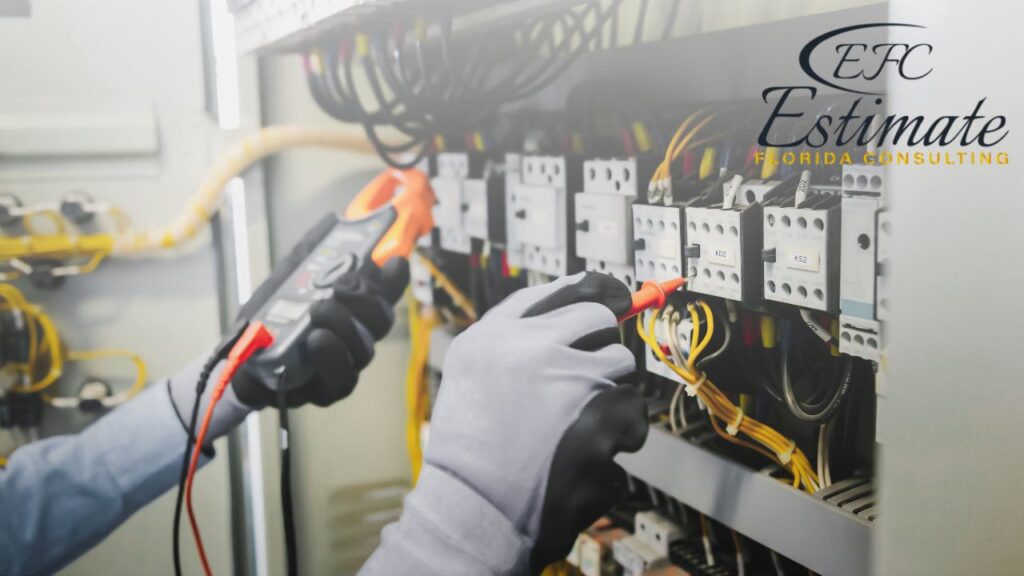
Lead Sheathed Wiring ($3.00 - $6.00 per foot)
Lead sheathed wiring features wires that are insulated and then covered with a sheath of lead, making it resistant to moisture, gases, and other corrosive substances. This type of wiring is suitable for buildings where fire safety and moisture resistance are crucial. The cost includes the lead sheathing and the labor for installation. It’s commonly used in older buildings and industrial settings, though its use has declined in favor of newer materials.
Underground Feeder Cable ($1.50 - $4.00 per foot)
Underground feeder cables are specifically designed for direct burial in the ground, providing a safe and efficient electrical supply to outdoor areas. These cables are insulated and encased in a tough jacket that withstands moisture and soil acidity. They are ideal for supplying power to outdoor lighting systems, garages, and other external structures. The cost covers the specialized cable and the labor involved in trenching and laying the cable.
Armoured Cable ($4.00 - $7.00 per foot)
Armoured cable, known for its robust construction, includes electrical conductors encased in a protective metal armor. This design offers enhanced protection against physical damage, making it suitable for industrial environments or areas where the cable is exposed to potential mechanical threats. It is often used in large-scale commercial and industrial installations, and the cost reflects the heavy-duty materials and the complexity of installation.
Get 5 New Leads in the Next 7 Days With Our System
- Multi-Family Building
- Hotel Building
- Hospital Building
- Warehouse Building
- High-Rise Building
- Shopping Complex
Electrical Outlet Price by Type
Electrical outlets come in various styles, capacities, and price ranges, ranging from as low as $3 to as high as $85 or more. Different types may be necessary for specific appliances, and using the wrong one can result in appliance damage, electrical shorts, or even fires. Misusing outlets can also void warranties on appliances or lighting fixtures. Additionally, it’s essential to match the number of prongs on plugs with the corresponding prong openings on outlets.
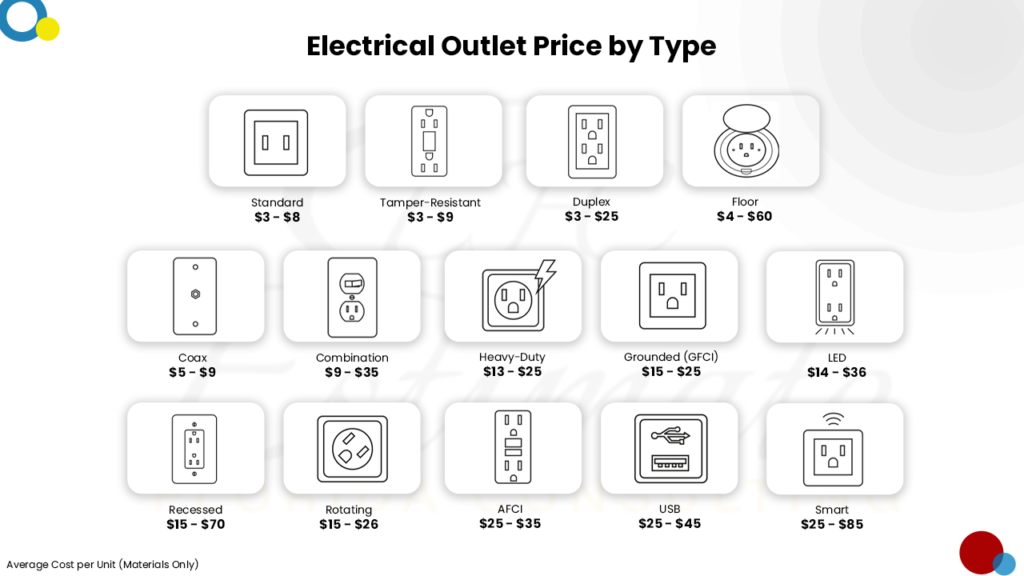
Type | Average Cost per Unit (Materials Only) |
Standard | $3 – $8 |
Tamper-Resistant | $3 – $9 |
Duplex | $3 – $25 |
Floor | $4 – $60 |
Coax | $5 – $9 |
Combination | $9 – $35 |
Heavy-Duty | $13 – $25 |
Grounded (GFCI) | $15 – $25 |
LED | $14 – $36 |
Recessed | $15 – $70 |
Rotating | $15 – $26 |
AFCI | $25 – $35 |
USB | $25 – $45 |
Smart | $25 – $85 |
Download Template For Electrical Project Breakdown
- Materials list updated to the zip code
- Fast delivery
- Data base of general contractors and sub-contractors
- Local estimators

Navigating the Costs of Electrical Installations and Repairs
The cost of electrical work is a pivotal component in the budgeting of construction and renovation projects. Variances in costs are influenced by the job’s complexity and the electrician’s hourly rate. Here’s an expanded look at the typical cost categories:
- Simple Electrical Jobs: Minor electrical tasks, such as replacing a faulty switch, fixing a broken outlet, or installing a new light fixture, typically start at an affordable rate of about $80. These jobs usually require less time and materials, and their simplicity means they can often be completed quickly and without extensive disruption. However, even these basic tasks should be handled by a professional electrician to ensure safety and adherence to local electrical codes.
- Installation or Repair of Fixtures and Switches: Installing or repairing fixtures like light fixtures, ceiling fans, outlets, and switches usually costs between $141 and $419. The variation in cost depends on the fixture’s type, design complexity, and whether the installation involves modifications to the existing wiring system. For instance, a standard light fixture installation would be on the lower end of this range, while installing a sophisticated, high-end lighting system or a smart home-enabled device would be more expensive due to the need for additional labor, wiring, and possibly even a new circuit.
- Larger Electrical Jobs: Bigger projects like wiring a new construction from scratch, upgrading an entire electrical panel to accommodate more circuits, or rewiring an old home to meet current standards are significantly more expensive. These jobs typically range from $2,000 to $6,000. They are labor-intensive and require a high degree of precision and knowledge to ensure that the electrical system is safe, efficient, and compliant with all relevant codes and regulations. Such projects often involve coordination with other construction processes, detailed planning, and potentially solving unforeseen issues that arise during the work.
- Wiring Changes: Alterations to existing electrical systems, such as adding new circuits to accommodate additional appliances or moving outlets to more convenient locations, generally start at $200. The cost increases with the complexity of the task, particularly if it involves accessing hard-to-reach wiring, extensive rerouting of existing wiring, or significant modifications to the home’s structure to accommodate the changes.
- Dedicated Circuits: Installing dedicated circuits for high-demand appliances like air conditioners, electric ranges, or home workshops is a common requirement in modern homes. These installations, which ensure that these appliances have a sufficient and safe power supply, typically cost around $700. This price includes the cost of running new wiring, installing a new breaker in the electrical panel, and ensuring that the installation is safe and meets all electrical codes. Dedicated circuits prevent overloading of the home’s electrical system, a crucial aspect for both safety and appliance longevity.
Estimate Your Project With Us
Electrical Wiring Cost by Type
When planning electrical work, the cost can be a decisive factor. For new construction, where fresh wiring is a part of the build, the expense is generally lower, ranging from $3 to $5 per square foot, including installation. Rewiring an existing house is typically costlier, reflecting the complexities of working within established structures. Such projects may cost between $6 to $10 per square foot. These figures reflect the intricacies and labor involved in safely installing compliant electrical systems that meet modern standards.
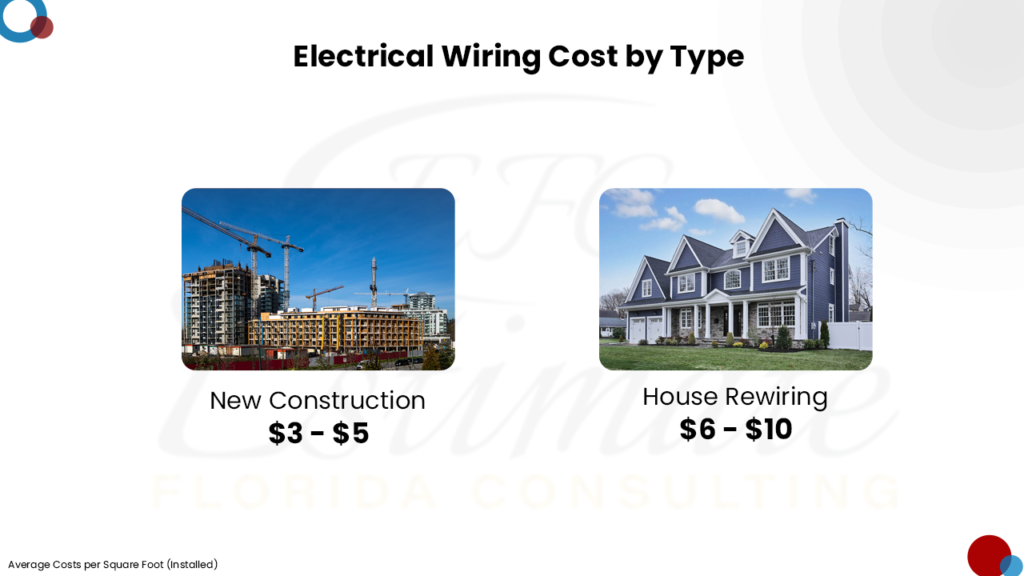
| WIRING TYPE | COST PER SQUARE FOOT (Installed) |
|---|---|
| New Construction | $3 to $5 |
| House Rewiring | $6 to $10 |
Business Finance Loan
Find out if you're pre-qualified in seconds

Get Prequalified Now
IMPORTANT: Make sure the email and phone number you enter are correct. We will email and text you a link to get started.
How Much Cost to Wire a House per Square Foot
Wiring a house is a significant aspect of its construction or renovation, and understanding the costs involved per square foot is crucial for homeowners planning their budget. The average cost to wire a home typically ranges between $5.50 and $7.70 per square foot, covering both labor and materials.
Cost Breakdown
This cost includes the rough wiring of the house — running wires through the walls, ceilings, and possibly floors — as well as the finishing work, such as installing outlets, switches, and fixture boxes. The price covers the necessary materials like wires, outlet and switch boxes, and protective conduits, as well as the labor cost of electricians who perform the installation.
Factors Affecting Cost
The total cost of wiring a house can vary based on several factors:
- Size of the House: Larger homes require more wiring, outlets, and switches, which increases the overall cost. The layout and design of the house can also impact the cost, as more complex designs might require more intricate wiring solutions.
- Number of Outlets and Switches: The more outlets and switches a house has, the higher the cost of wiring. This is due to the additional materials and labor required for each additional electrical point.
- Complexity of Requirements: Homes with more complex electrical needs, such as smart home systems, dedicated circuits for heavy appliances, or specialized lighting systems, will see higher costs due to the additional work and specialized components required.
Average Wiring Costs by House Size
The cost of wiring is also influenced by the total square footage of the house. Here’s a breakdown of average costs for different house sizes:
- 800 sq.ft. Home: Wiring an 800 square foot home will cost between $3,740 and $6,600.
- 1,000 sq.ft. Home: For a 1,000 square foot home, the average cost ranges from $5,500 to $7,700.
- 1,300 sq.ft. Home: Wiring a 1,300 square foot home can cost between $5,940 and $9,350.
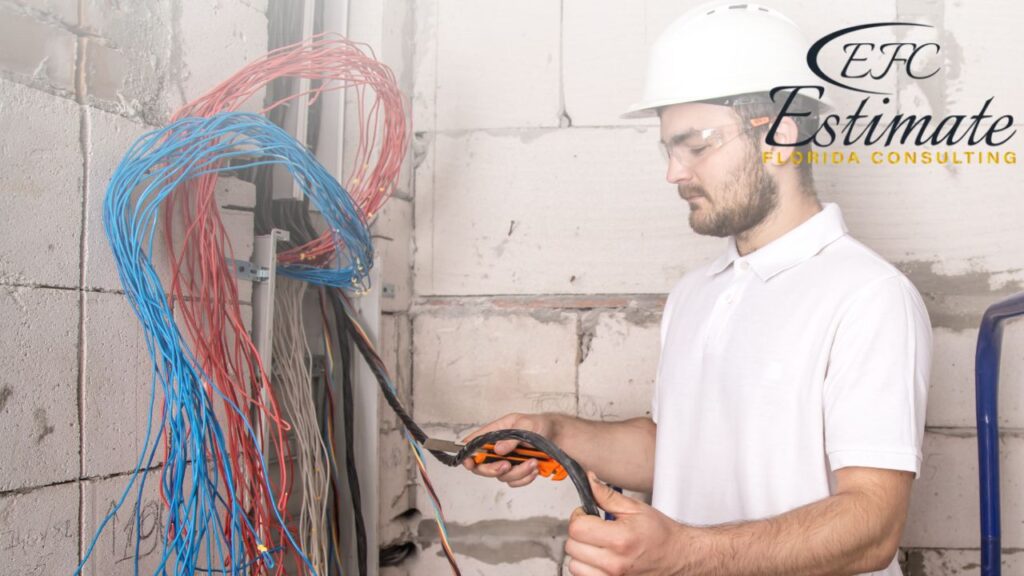
- 1,600 sq.ft. Home: The cost for a 1,600 square foot home falls between $9,350 and $12,100.
- 2,000 sq.ft. Home: A larger 2,000 square foot home will typically cost between $11,000 and $15,400 to wire.
How Much Cost Electrical Installation For New Building?
Calculating the total cost of electrical installation for a new commercial building involves more than just considering the per-square-foot price; it also hinges on the overall size of the building. With the cost of wiring in commercial construction ranging from $7 to $20 per square foot, the total expense can vary greatly depending on the project’s scale.
For example, if you’re working on a modestly sized 1,000 square foot commercial space, the electrical installation could cost anywhere from $7,000 to $20,000 in total. However, for larger projects, like a 10,000 square foot building, the costs could escalate significantly, ranging from $70,000 to a substantial $200,000.
These estimates underscore the importance of factoring in both the size of the building and the unit cost to get a realistic idea of the total electrical installation expenses. The final tally is also influenced by the specific electrical needs of the building, the intricacies of the wiring job, and the quality of materials and labor involved. Proper budgeting and planning are thus essential for managing the financial aspects of a commercial construction project effectively.
Need Template For Your Electrical Business
We provide services for Brochure, Banner, Business Card, Envelope, Invoice, etc.

How Much Cost Electrical Installation For Hospital?
The cost of electrical installation in a hospital setting is a substantial component of the overall construction budget, reflecting the complex and critical nature of electrical systems in healthcare facilities. On average, the cost for electrical work in hospital construction ranges from $7 to $20 per square foot. Given the extensive and specialized electrical needs of hospitals, which include advanced medical equipment, emergency power systems, and extensive lighting and HVAC requirements, this pricing is comprehensive. For a typical hospital project, this means the total electrical installation cost can fall between $900,000 and $1,500,000. This broad range accounts for various factors such as the size of the hospital, the complexity of its electrical needs, and regional cost variations. The higher end of the spectrum is often reflective of more specialized requirements, such as sophisticated diagnostic and treatment equipment, patient monitoring systems, and enhanced emergency power capabilities, all crucial for hospital functionality and patient safety.
Conclusion
The Electrical Cost Estimator project in Alachua represents a critical endeavor requiring meticulous planning, expertise, and adherence to local regulations. Through careful site assessments, collaboration with stakeholders, accurate cost estimates, and compliance with building codes, the project can be executed efficiently and safely. By incorporating solutions to common challenges such as weather disruptions, environmental risks, and trade coordination, the project can navigate complexities effectively. Transparent communication and budget management ensure alignment with stakeholders’ expectations and financial constraints. Ultimately, the successful completion of the Electrical Cost Estimator project not only enhances the electrical infrastructure in Alachua but also contributes to the safety, functionality, and sustainability of the community’s built environment.
Are You Looking For?

Fully Insured License
Hire Subcontractor For Electrical Work

Make Informed Design Decisions Showcase Your Design Ideas
Get RenderingCall Us To Discuss More at 561-530-2845
FAQs
Electricians in Alachua generally charge between $40 to $150 per hour. However, for most projects, the average cost is more commonly within the $50 to $150 range.
The complexity of the electrical work required significantly impacts the cost. More complex projects, especially in commercial settings, tend to fall towards the higher end of the pricing spectrum.
Key factors include the electrician’s level of expertise, the specific requirements of the electrical work, and the geographic location of the project.
To estimate labor costs, multiply the electrician’s hourly rate by the total hours needed to complete the project. This calculation gives a clear idea of the overall labor expenses.
Yes, commercial electrical projects often lean towards the higher end of the cost range due to their larger scale and increased complexity compared to residential projects.
Process To Get Electrical Cost Estimate Report
Here I am going to share some steps to get your electrical cost estimate report.
-
You need to send your plan to us.
You can send us your plan on info@estimatorflorida.com
-
You receive a quote for your project.
Before starting your project, we send you a quote for your service. That quote will have detailed information about your project. Here you will get information about the size, difficulty, complexity and bid date when determining pricing.
-
Get Estimate Report
Our team will takeoff and estimate your project. When we deliver you’ll receive a PDF and an Excel file of your estimate. We can also offer construction lead generation services for the jobs you’d like to pursue further.
Google Reviews





